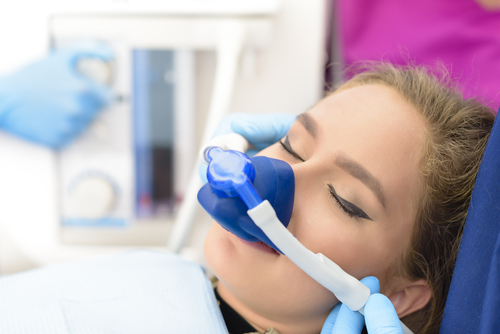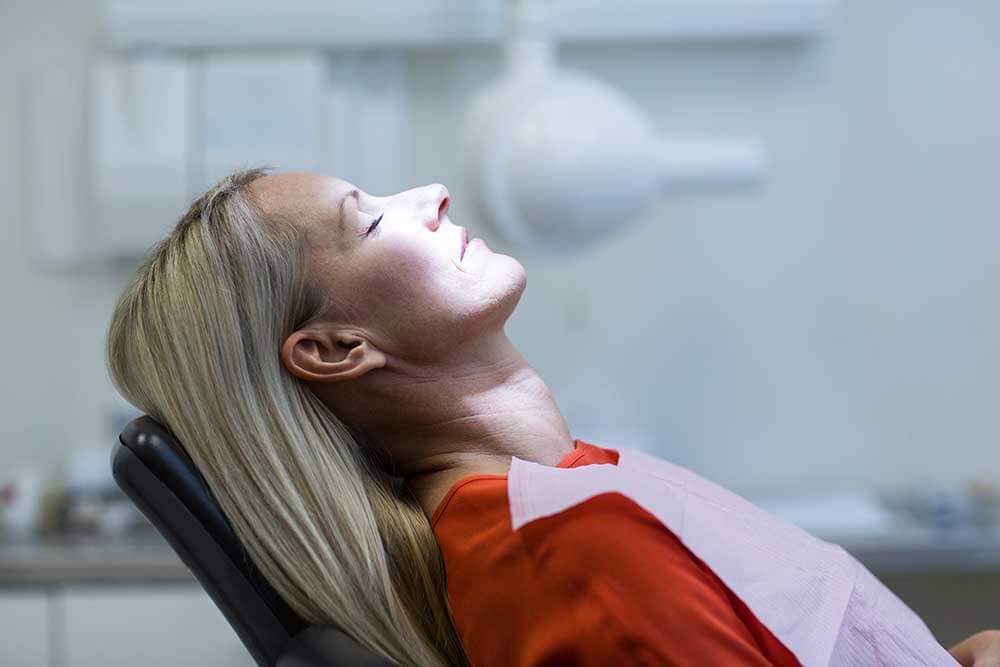Nitrous Oxide
Frequently referred to as laughing gas, nitrous oxide is administered through a small mask that’s worn over your nose. You’ll begin to feel the effects within seconds of breathing it in, allowing you to relax so we can begin your treatment.
You’ll remain conscious throughout the procedure, but you won’t feel any discomfort and likely won’t remember the experience later. Best of all, the sedation effects of nitrous oxide can be reversed almost immediately so you won’t need to depend on anyone for a ride home.

IV Sedation
For patients who choose IV sedation, we’ll administer a powerful sedative directly into the bloodstream through an IV tube. The medication takes effect quickly, putting you in a state of “twilight sleep” where you’ll remain responsive but deeply relaxed.
You won’t feel any pain and likely won’t even remember your treatment experience after it’s finished. Make sure to plan for a ride home if you choose IV sedation, since the effects can take a few hours to completely wear off.

Frequently Asked Questions
Is dental sedation safe?
Dental sedation is a safe and reliable way to relax during your procedure. We’ll monitor your vital signs throughout the procedure to ensure they remain at a normal level. If any problem is detected, we can stop your treatment and begin reversing the sedation at once.
If you suffer from conditions like obesity or sleep apnea, you may be at risk for complications from sedation. During your initial consultation with Dr. Peters, make sure to inform him of any medical conditions that you have so he can determine a safe treatment plan for you.
Will I be awake during my procedure?
A common misconception about dental sedation is that you’ll be unconscious during treatment, but this isn’t the case. You’ll remain awake and responsive throughout your procedure no matter which sedation option you choose.
Sedation puts you in a state of deep relaxation. Because many patients don’t remember their procedures afterward, this state of consciousness is referred to as “twilight sleep.”
Do you feel pain with dental sedation?
No matter which sedation option you undergo, your procedure will be painless and stress-free. Unlike local anesthesia, which can only numb pain, dental sedation can put you in a state of deep relaxation. Our sedation dentistry methods are the perfect solution for patients with dental anxiety.
Can I eat before dental sedation?
It’s crucial to avoid eating or drinking anything at least six hours before sedation. You can still drink plain water two hours before your appointment, however.
Under sedation, your reflexes become suppressed. Having food or drink in your stomach while sedated may lead to complications. If you eat or drink too close to your appointment, you’ll need to reschedule.
How long does dental sedation last?
The effects of dental sedation typically subside after 24 hours. During this time, you may experience headaches, nausea, or drowsiness. You may also have difficulty remembering your procedure.
To protect your safety, we insist that someone drive you home from your appointment. You should also avoid any strenuous or potentially risky activities until the sedative has worn off completely.
What are some ways I can deal with dental anxiety?
Dental anxiety can make it difficult for patients to receive the care they need. Aside from dental sedation, some other methods can help relieve feelings of anxiety:
- Avoid caffeine before your appointment
- Listen to music during your appointment
- Arrive at your appointment on time
- Take slow, regular breaths
- Use hand signals if you experience discomfort
If you suffer from dental anxiety, Dr. Peters can help make you feel more at ease during your appointment. For certain procedures, dental sedation may be the ideal solution.


